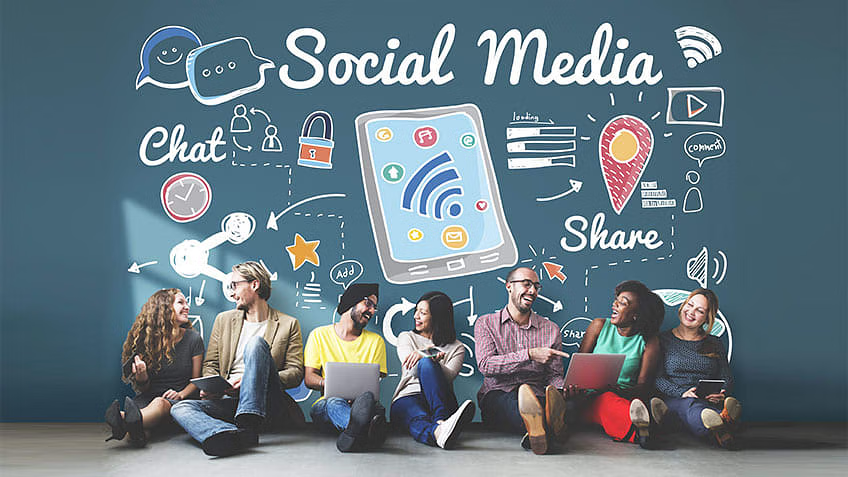Social media has become an integral part of modern life, revolutionizing the way we communicate, consume information, and even do business. From its humble beginnings with platforms like Friendster and MySpace to the multi-billion-dollar giants like Facebook, Instagram, and TikTok, social media has evolved dramatically. As we approach 2025, the future of social media seems poised for even more profound shifts in terms of technology, user experience, and social impact.
In this article, we will explore the most significant social media trends to watch for in 2025. From the rise of immersive experiences like virtual and augmented reality to the growing emphasis on privacy and mental health, these trends will shape the next generation of digital interaction.
1. The Rise of Augmented Reality (AR) and Virtual Reality (VR)
Overview
Augmented reality (AR) and virtual reality (VR) have already started to influence social media in significant ways. While AR has found a home in filters and interactive features on platforms like Instagram and Snapchat, VR has yet to fully integrate into mainstream social media experiences. By 2025, both technologies are expected to play a central role in how people connect and communicate online.
What to Expect
- Social VR Platforms: In 2025, it’s likely we will see the rise of full-fledged social VR platforms. These platforms will allow users to interact in immersive, 3D environments using VR headsets, creating entirely new ways to socialize, play games, or collaborate in professional settings. Social media companies, including Meta (formerly Facebook), are already heavily investing in the metaverse, a virtual reality space where users can interact with each other and the digital world.
- AR-Driven User Experiences: Augmented reality will continue to enhance the way we interact with content. Instagram, Snapchat, and other platforms will likely offer even more advanced AR filters, allowing users to modify their appearance or interact with the environment in real-time. Expect AR to become a critical tool for e-commerce, allowing users to “try on” products, such as makeup or clothing, before making a purchase.
Impact
By 2025, AR and VR could make social media experiences more interactive and engaging than ever before. These immersive technologies will blur the lines between the physical and digital worlds, opening up new possibilities for communication, entertainment, and commerce.
2. More Authentic Content and User-Generated Stories
Overview
The shift towards authenticity in social media content has already begun, with users increasingly preferring raw, unfiltered content over polished, curated posts. In 2025, this trend is expected to accelerate, as platforms like Instagram and TikTok continue to prioritize more genuine, relatable storytelling over highly stylized content.
What to Expect
- Rise of “Real-Time” Content: Video platforms like TikTok and Instagram Stories are already encouraging spontaneous, unpolished content. By 2025, this trend will likely become even more prevalent as people seek to create content that feels real and unedited, rather than highly produced or curated. Expect more influencers and brands to embrace imperfection, transparency, and behind-the-scenes content.
- User-Generated Content: Consumers have already started creating their own brand-centric content, and this trend is expected to grow. Social media platforms will likely offer tools for businesses to tap into user-generated content more effectively, creating a deeper sense of community and engagement.
Impact
This trend toward authenticity will shift the dynamics of influencer marketing, creating opportunities for smaller, micro-influencers to thrive by connecting more authentically with their audiences. The focus will move toward storytelling and experiences rather than just polished advertisements or overly curated aesthetics.
3. Privacy and Data Security Concerns
Overview
With the increasing number of data breaches and growing concerns over personal information, privacy will become a significant issue for social media users in the coming years. By 2025, platforms will be under increasing pressure to be more transparent about how they handle user data and to give individuals more control over their privacy.
What to Expect
- Increased Privacy Regulations: By 2025, governments worldwide will likely implement stricter data protection laws. Social media companies will need to comply with these regulations, ensuring that user data is secure and not misused. Users will have more control over their data, with clearer opt-in/opt-out options for data collection and sharing.
- Privacy-Focused Platforms: Social media platforms that emphasize privacy, like Signal and Telegram, may gain more mainstream attention, especially if users become more aware of how their personal information is being used by larger platforms. The trend toward encrypted communication and secure platforms may become the norm, especially for sensitive topics.
Impact
The growing focus on privacy will lead to a shift in user behavior. Users will demand more transparency from platforms regarding data usage, and social media companies will need to adjust their business models to accommodate these concerns. Expect more secure platforms and features, along with an increasing emphasis on end-to-end encryption and user autonomy.
4. Social Commerce and Shopping Integration
Overview
Social commerce, the fusion of e-commerce and social media, has gained momentum in recent years, with platforms like Instagram, Facebook, and TikTok enabling users to shop directly from the apps. By 2025, this trend will likely continue to evolve, offering even more seamless shopping experiences within social media environments.
What to Expect
- Shoppable Posts and Live Streaming: In 2025, expect shoppable posts and live-streamed shopping events to become even more sophisticated. Instagram and TikTok are already testing ways to integrate shopping directly into their platforms, and by 2025, these capabilities will be more refined. Expect influencers and brands to host live shopping events, where viewers can purchase items in real-time.
- Augmented Reality for Shopping: AR features will become increasingly common in social commerce. Platforms may introduce more immersive tools that allow users to try on clothes, makeup, and accessories in AR before making a purchase. This virtual shopping experience will make online shopping feel more tangible and personal.
Impact
As social media platforms continue to evolve into shopping hubs, we’ll see a greater blend of content and commerce. Users will have access to an easier, more engaging way to shop, with product discovery integrated directly into the social media experience. For businesses, social commerce presents new opportunities to reach and convert customers where they already spend a lot of their time.
5. AI-Powered Content Creation and Curation
Overview
Artificial intelligence (AI) has already made significant strides in content creation, from generating captions to producing videos. By 2025, AI will likely play an even bigger role in content creation and curation on social media platforms, offering tools that can help individuals and businesses produce high-quality content more efficiently.
What to Expect
- AI-Generated Content: In the future, social media platforms may offer advanced AI tools that help users generate videos, captions, and even entire posts based on minimal input. These tools will be capable of understanding context, tone, and trends, creating personalized content that resonates with audiences.
- Smart Content Curation: Social media platforms will use AI algorithms to curate content more effectively, providing users with posts that are not only relevant but also tailored to their individual preferences. This could include personalized news, updates from friends, and curated advertisements that feel less intrusive and more natural.
Impact
AI-driven content creation will make it easier for people to produce high-quality, engaging content, even without professional experience. This could lead to a rise in user-generated content, giving individuals greater creative control over their social media presence. Additionally, smarter curation could enhance the user experience by ensuring that the content you see is relevant and engaging.
6. Mental Health and Social Media Awareness
Overview
As social media continues to grow in influence, concerns about its impact on mental health are increasingly taking center stage. Platforms like Instagram, TikTok, and Facebook are under pressure to address issues like cyberbullying, body image issues, and social media addiction. By 2025, it’s expected that platforms will adopt more measures to protect user well-being.
What to Expect
- Wellness-Focused Features: Social media platforms will likely introduce more features aimed at promoting mental well-being. These could include tools to help users take breaks from apps, reminders to engage in positive interactions, or features that limit harmful content.
- Greater Regulation on Harmful Content: In response to growing concerns about cyberbullying, misinformation, and harmful content, platforms will be expected to implement more robust moderation systems. AI and human moderators will work together to ensure that content is safe, positive, and supportive.
Impact
As awareness about the impact of social media on mental health continues to grow, users will expect platforms to take more responsibility for their content. The focus on user wellness will likely result in more supportive environments, better resources for managing stress, and a shift toward promoting positive interactions online.
Conclusion
The future of social media is an exciting and transformative one. As we approach 2025, advancements in AR, VR, AI, privacy, and social commerce are set to reshape how we engage with digital content. With increasing awareness about mental health and privacy concerns, social media platforms will need to prioritize user well-being while offering innovative, immersive, and engaging experiences.
For businesses and creators, these changes present new opportunities to connect with audiences in deeper and more meaningful ways. Whether through AI-generated content, social commerce, or new immersive platforms, the landscape of social media will continue to evolve, making it essential for users and businesses alike to stay ahead of these trends.
Key Takeaways:
- Augmented Reality (AR) and Virtual Reality (VR) will play a major role in social media, enhancing immersive experiences for users.
- Authentic content will dominate, with a focus on real-time, raw posts and user-generated stories.
- Privacy and data security concerns will drive platforms to become more transparent and user-focused on data control.
- Social commerce will continue to grow, allowing users to shop directly through social media platforms.
- AI-powered tools will revolutionize content creation and curation, making it easier for users to generate high-quality content.
- Mental health awareness will increase, with platforms focusing on user wellness and creating positive, supportive environments.
Social media in 2025 will not just be a space for entertainment; it will be a place of connection, self-expression, commerce, and engagement in ways we have yet to fully imagine.

